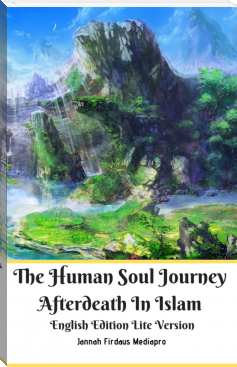Swiss Family Robinson - Johann David Wyss (poetry books to read txt) 📗

- Author: Johann David Wyss
- Performer: -
Book online «Swiss Family Robinson - Johann David Wyss (poetry books to read txt) 📗». Author Johann David Wyss
upon the wild free will of nature in this lonely place. With one
consent storms, floods, torrents, and the wild beasts of the forest,
had set themselves to destroy it.
We resolved to make the defences doubly strong, being convinced that
the position was capable of being barricaded and fortified so as to
resist the invaders we dreaded.
The prospect which opened before us on emerging from the rocky pass was
wide, and varied. Swelling hills and verdant wooded vales were seen on
one hand, while a great plain stretched before us, extending from the
banks of the river towards a chain of lofty mountains, whose summits
were rendered indistinct in the haze of the distance.
We crossed the stream, which we named East River, filling our flasks
with water, and it was well we did so, for in continuing our journey,
we found the soil become more arid and parched than we had expected; in
fact we soon appeared surrounded by a desert.
The boys were astonished at the altered appearance of the country, part
of which had been explored when we met with the buffaloes. I reminded
them of the difference of the season; that the expedition had been made
directly after the rains, when vegetation had clothed with transient
beauty this region, which, possessing no source of moisture in itself,
had become scathed and bare during the blazing heat of summer.
Our march proceeded slowly, and many were the uncomplimentary remarks
made on the `new country’.
It was `Arabia Petrea,’ groaned one.
`Desert of Sahara,’ sighed another.
`Fit abode for demons,’ muttered a third. `Subterranean volcanic fires
are raging beneath our feet.’
`Patience, my good fellows!’ cried I. `You are too easily discouraged.
Look beyond the toilsome way to those grand mountains whose spurs are
already stretching forward to meet us. Who knows what pleasant
surprises await us amid their steep declivities? I, for my part, expect
to find water, fresh grass, trees and a lovely resting-place.’
We were all glad to repose beneath the shade of the first overhanging
rock we came to, although by pressing further upwards, we might have
attained to a pleasanter spot.
Looking back towards the Gap, we marked the strange contrast of the
smiling country bordering the river, and the dreary, monotonous plain
we had traversed.
After gazing on the distant scene, we produced our store of
provisions, and were busily engaged, when Knips (our constant
companion) suddenly began to snuff and smell about in a very
ridiculous way; finally, with a shriek which we knew was expressive of
pleasure, he set off at full speed, followed by all the dogs, up a sort
of glen behind us.
We left them to their own devices, being far too pleasantly engaged
with our refreshments to care much what fancy the little rogue had got
in his head.
When hunger was somewhat appeased, Fritz once more cast his eyes over
the expanse of plain before us, and after looking fixedly for a moment,
exclaimed:
`Is it possible that I see a party of horsemen riding at full gallop
towards us! Can they be wild Arabs of the desert?’
`Arabs, my boy! Certainly not; but take the spy-glass and make them out
exactly. We shall have to be on our guard, whatever they are!’
`I cannot see distinctly enough to be sure,’ said he presently, `and
imagination supplies the deficiency of sight in most strange fashion. I
could fancy them wild cattle, loaded carts, wandering hay-cocks, in
fact almost anything I like.’
The spy-glass passed from hand to hand; Jack and Ernest agreed in
thinking the moving objects were men on horseback; but when it came to
my turn to look, I at once pronounced them to be very large ostriches.
`This is fortunate indeed!’ I exclaimed. `We must try to secure one of
these magnificent birds; the feathers alone are worth having.’
`A live ostrich, father! That would be splendid. Why, we might ride
upon him!’
As the ostriches approached, we began to consider in what way we
should attempt a capture. I sent Fritz and Jack to recall the dogs, and
placed myself with Ernest behind some shrubs which would conceal us
from the birds as they came onwards.
The boys did not rejoin us for some little time; they found Knips and
the dogs at a pool of water formed by a small mountain stream, which
the monkey’s instinct had detected; his sudden departure was thus
accounted for, and they availed themselves right gladly of his
discovery, filling their flasks, and hastily bathing before their
return.
The ostriches continued to come in our direction, varying their pace as
though in sport, springing, trotting, galloping and chasing each other
round and round, so that their approach was by no means rapid.
I could now perceive that of the five birds one only was a male, the
white plumes of the wings and tail contrasting finely with the deep
glossy black of the neck and body.
The colour of the females being ashen brown, the effect of their white
plumes was not so handsome.
`I do not believe we shall have a chance with these birds,’ said I,
`except by sending Fritz’s eagle in pursuit; and for that we must bide
our time, and let them come as near as possible.’
`In what way, then, are ostriches caught by the natives of the African
deserts?’ inquired Fritz.
`Sometimes by chase on horseback; but their speed is so very great,
that even that must be conducted by stratagem.
`When these birds are pursued, they will run for hours in a wide
circle; the hunter gallops after them, but describes a much smaller
circle, and can therefore maintain the pace for a longer time, waiting
to make the attack until the bird is fatigued.
`Among the Bushmen, the hunter sometimes envelops himself in the skin
of an ostrich, his legs doing duty for those of the bird, and his arm
managing the head and neck so as to imitate the movements of the bird
when feeding. The enterprising hunter is thus enabled to get among a
flock of ostriches, and to shoot them with arrows one after another.
`When aware of an enemy they defend themselves desperately, using
their powerful legs as weapons, always kicking forwards, and
inflicting dreadful injuries on dogs, and even on men if attacked
without due precaution. But let us take up our positions, and keep
perfectly still, for the ostriches are at hand!’
We held the dogs concealed as much as possible; the stately birds
suddenly perceiving us, paused, hesitated and appeared uneasy. Yet as
no movement was made, they drew a few steps nearer, with outstretched
necks, examining curiously the unwonted spectacle before them.
The dogs became impatient, struggled from our grasp and furiously
rushed towards our astonished visitors. In an instant they turned and
fled with the speed of the wind; their feet seemed not to touch the
ground, their wings aiding their marvellously rapid progress.
In a few moments they would have been beyond our reach, but as they
turned to fly the eagle was unhooded. Singling out the male bird the
falcon made his fatal swoop, and, piercing the skull, the magnificent
creature was laid low. Before we could reach the spot the dogs had
joined the bird of prey, and were fiercely tearing the flesh and
bedabbling the splendid plumes with gore.
This sight grieved us. `What a pity we could not capture this glorious
bird alive!’ exclaimed Fritz, as we took its beautiful feathers. `It
must, I am sure, have stood more than six feet high, and two of us
might have mounted him at once!’
`In the vast sandy deserts where nothing grows, what can flocks of
these birds find to live upon?’ inquired Ernest.
`That would indeed be hard to say, if the deserts were utterly barren
and unfruitful,’ returned I, `but over these sandy wastes a beneficent
Providence scatters plants of wild melons, which absorb and retain
every drop of moisture, and which quench the thirst as well as satisfy
the hunger of the ostriches and other inhabitants of the wilds. These
melons, however, do not constitute his entire diet; he feeds freely on
grasses, dates and hard grain, when he can obtain them.’
`Does the ostrich utter any cry?’
`The voice of the ostrich is a deep hollow rumbling sound, so much
resembling the roar of the lion as to be occasionally mistaken for it.
But what does Jack mean by waving his cap, and beckoning in that
excited fashion? What has the boy found, I wonder?’
He ran a little way towards us, shouting: `Eggs, father! Ostriches’
eggs! A huge nest-full—do come quickly!’ We all hastened to the spot,
and in a slight hollow of the ground, beheld more than twenty eggs, as
large as an infant’s head.
The idea of carrying more than two away with us was preposterous,
although the boys, forgetting what the weight would be, seriously
contemplated clearing the nest. They were satisfied when a kind of
landmark had been set up, so that if we returned we might easily find
the nest.
As each egg weighed about three pounds, the boys soon found the burden
considerable, even when tied into a handkerchief and carried like a
basket. To relieve them, I cut a strong elastic heath stick, and
suspending an egg in its sling at each end, laid the bent stick over
Jack’s shoulder, and like a Dutch dairy-maid with her milkpails, he
stepped merrily along without inconvenience.
We presently reached a marshy place surrounding a little pool
evidently fed by the stream which Knips had discovered. The soft
ground was trodden and marked by the footsteps of many different sorts
of animals; we saw tracks of buffaloes, antelopes, onagers or quaggas,
but no trace whatever of any kind of serpent: hitherto our journey in
search of monster reptiles had been signalized by very satisfactory
failure.
By this brook we sat down to rest and take some food; Fangs presently
disappeared, and Jack calling to his pet discovered him gnawing at
something which he had dug from the marsh.
Taking it for a root of some sort, Jack brought it for my inspection. I
dipped it in water to clear off the mud, and to my surprise found a
queer little living creature, no bigger than half an apple, in my hand.
It was a small tortoise.
`A tortoise, I declare!’ cried Fritz. `What a long way from the sea.
How came it here, I wonder?’
`Perhaps there has been a tortoise-shower,’ remarked Ernest. `One
reads of frog-showers in the time of the ancient Romans.’
`Hollo, Professor! You’re out for once,’ said I. `This is nothing but a
mud-tortoise, which lives in wet, marshy ground and fresh water. They
are useful in gardens; for although they like a few lettuce leaves now
and then, they will destroy numbers of snails, grubs, and worms.’
Resuming our journey, we arrived at a charming valley, verdant,
fruitful, and shaded by clumps of graceful trees. It afforded us the
greatest delight and refreshment to pass along this cool and lovely
vale, which we agreed to call Glen Verdant.
In the distance we could see herds of antelopes or buffaloes feeding;
but as our dogs continually ranged a long way ahead of us, they were
quickly startled, and vanished up one or other of the narrow gorges
which opened out of the valley.
Following the imperceptible windings of the vale, we were surprised, on
quitting it for the more open ground, to find ourselves in country





Comments (0)